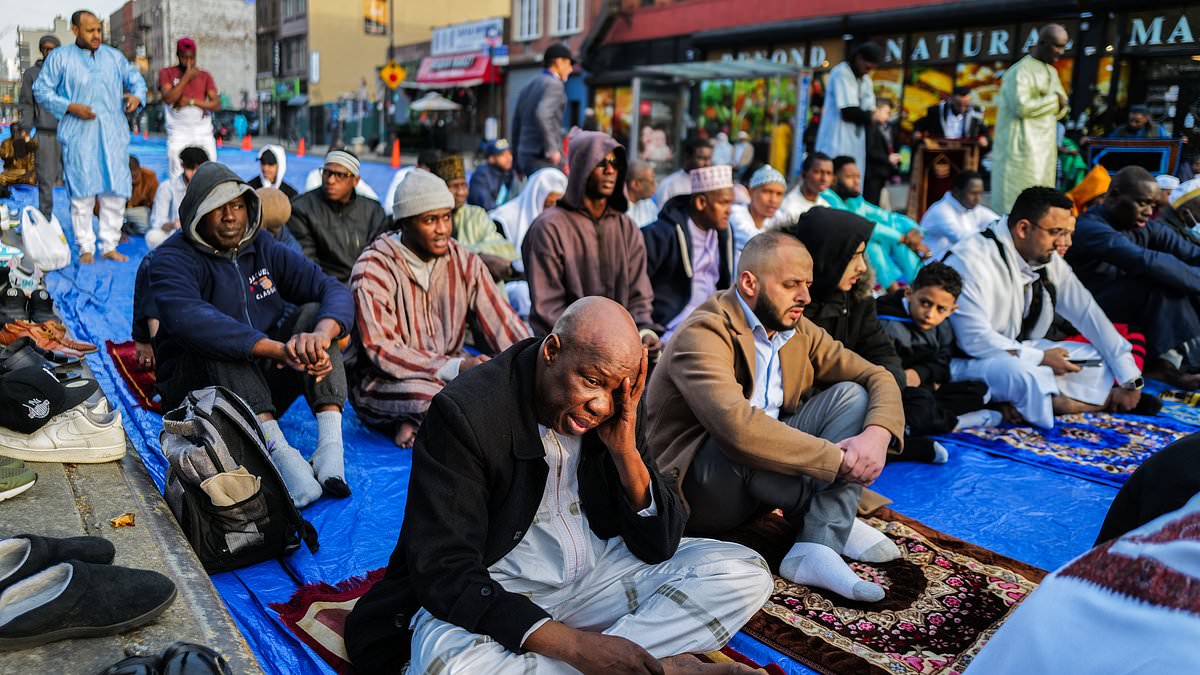Copyright dailymail

For decades, reciting the Pledge of Allegiance was a daily reminder that the United States was 'one nation under God.' But the Christian faith that once defined American values is on track to lose its majority status by 2070. According to the Pew Research Center, 62 percent of Americans say they are Christian now compared to around 90 percent in 1970. If current trends continue, Pew projects it could fall to 46 percent by 2070 - a decline that has Pastor Brent Madaris and other religious leaders sounding the alarm. Madaris, of Hometown Hope Ministries, told the Daily Mail the data should be 'an urgent call for church renewal,' warning that Christian communities have taken their eyes off the ball while rival faiths gain ground. The decline comes as other religions, most notably Islam, continue to grow. In the US, there are roughly 100,000 more Muslims annually while there are around two million fewer Christians. Muslims still remain a small minority, with around four million followers compared with roughly 200million Christians, but their communities are shaping differently on the ground. The number of US mosques increased 31 percent between 2010 and 2020, from 2,106 to 2,769, according to the Islamic Resource Center. Meanwhile, roughly 1,500 Christian churches closed during the same period. Islam's growth in the US is being fueled by Muslims' relatively young age structure and high fertility rate, according to Pew Research Center. Islam currently has a younger median age - 35 compared with 54 for Christians - suggesting youth adherents could accelerate the religion's growth. In 2017, the center estimated immigration was also driving the boom. And in February, CBS found that tens of thousands of Americans in prison convert to Islam each year. Madaris told the Daily Mail that part of the problem lies in how many Christians practice their faith. Unlike Islam, which often maintains strict adherence across generations, American Christians increasingly pick and choose which parts of doctrine to follow. This blending of beliefs - often called syncretism - can dilute religious identity and weaken long-term retention. 'Pastors are not preaching the whole counsel of God,' Madaris told the Daily Mail. 'Seminaries are certifying people to lead churches who have no business doing so. 'Church youth groups major on games, attendance and fun rather than truth, biblical depth and spiritual fruit.' Dr George Barna, Director of Research and co-founder of the Cultural Research Center at Arizona Christian University, told the Daily Mail that American religious stability is 'becoming increasingly shaky.' 'The continued decline is neither surprising nor something that is likely to change in the near future unless dramatic changes are made,' Barna said. His research points to multiple factors behind Christianity's slide: the rise of Islam and New Age religions, shifting identities among traditionally Christian Hispanics, and a broader cultural loss of confidence in organized religion. 'Families and churches today have relaxed standards for what constitutes Christianity, and parents aren't raising their children in the church like they once were,' he added. There are, however, hints of a revival on the political right. Events such as the memorial for conservative activist Charlie Kirk have showcased a renewed embrace of Christian values among younger, politically engaged Americans. But experts caution it's too early to detect any broad uptick in the population data, and when looking at national trends, Christianity is still on the decline. Globally, Pew Research shows Islam grew 20.7 percent between 2010 and 2020, compared with just 5.7 percent for Christianity. Yet the greatest challenge to Christianity may not be other religions but the rise of the 'nones' - Americans who identify as atheist, agnostic, or unaffiliated - who are projected to make up a slim majority (52 percent) by 2070. Barna told the Daily Mail that pastors often focus more on retaining congregations than confronting broader cultural shifts. 'The religious marketplace is certainly more competitive today than in the recent past,' he said. 'That's partially due to the instant accessibility of massive amounts of information about religious alternatives, and the copious amounts of negative information flooding the marketplace about Christians and Christian churches.' Syncretism, he added, has further weakened adherence. 'The blending of faith beliefs and practices from numerous competing religions into a customized faith unique to that individual has already profoundly infiltrated and redefined the American Christian community, replacing biblical Christianity with its idiosyncratic approach to life,' he said. Despite the decline, Christianity remains America's largest faith, with 62 percent of Americans still identifying as Christian - most of them Evangelical Protestant, Mainline Protestant or Catholic. Yet with Islam expanding, younger generations drifting from the pews, and the 'nones' on track to become the majority, church leaders warn the clock is ticking. 'The continued decline doesn't have to be inevitable,' Madaris told the Daily Mail. 'We need to reclaim lost ground.' Barna agreed, saying that 'unless dramatic changes are made, the American church will continue to fade into the background.



